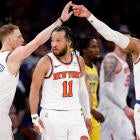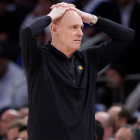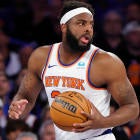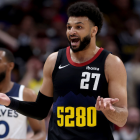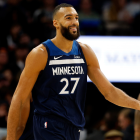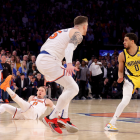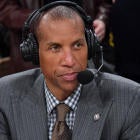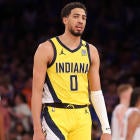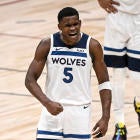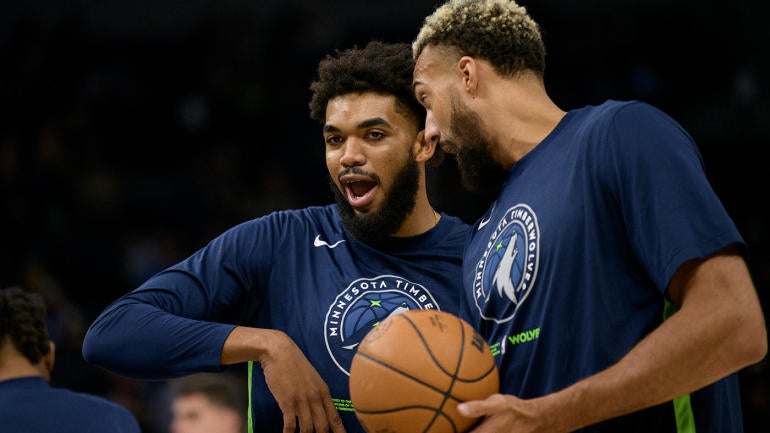
SAN FRANCISCO -- You don't want to be reductive, but a single, clutch play represents the danger that the Minnesota Timberwolves bring to any impending playoff matchup, should they get there.
In the final seconds of the Wolves' crucial matchup against the Warriors on Sunday, with Western Conference postseason positioning in the balance, Golden State had possession and a one-point lead with about a four-second differential between the shot clock and game clock.
Here's where the Wolves' unique diversity reveals itself.
First, Stephen Curry gets past his defender and dribbles into the paint, but waiting right there for him is arguably the best rim protector in the game -- 7-foot-1 center Rudy Gobert. Curry understandably kicks the ball back out to Draymond Green, one of the smartest and most accomplished playmakers in the NBA for the past decade. Green meets his match, this time at least, with Kyle Anderson, who Wolves head coach Chris Finch recently called "in many ways, our most important player" because of his intelligence and versatility.
Anderson knew that Green, a 70% free-throw shooter this season, didn't want to be fouled, so he anticipated the pass and used his freakishly long arms and quick hands to pick up the steal.
Affectionately known as "Slo-Mo," Anderson sauntered up the court with the basketball before pitching it back to 7-foot franchise big man Karl-Anthony Towns, who didn't hesitate to swish a 3-pointer from the top of the key. It ended up being the game-winning shot.
KAT. CLUTCH. 😼 pic.twitter.com/DICnBtBQnE
— Minnesota Timberwolves (@Timberwolves) March 27, 2023
"My mindset, you know, obviously it's always going to be when those last two minutes, clutch time comes, I gotta go out there and earn my check," said Towns, who went 5-for-16 from the field in his second game back from a calf injury that cost him nearly four months. "I'm glad I was able to earn it tonight."
Gobert's defense. Anderson's IQ. Towns' unprecedented shooting ability for a player his size. It was all on display in a matter of seconds. Oh yeah, and there's also this guy named Anthony Edwards, a 21-year-old power guard averaging almost 25 points per game.
All those components, plus a few more, are why Minnesota's recent stretch of four wins in five games should scare any potential playoff opponent. You don't want this team -- currently No. 7 in the West -- to be hot heading into the postseason, because, now that Towns is healthy, they present a matchup nightmare.
Towns and Gobert haven't really gotten a chance to play together much, and the early results were thoroughly mediocre. In their first 22 games together, before Towns' injury, the Wolves essentially had a zero net rating with their two All-Star bigs on the floor together. Since Towns' return, however, the results have been much more encouraging. It's only been three games, but Minnesota has a net rating of plus-9.7 in 54 minutes with Towns and Gobert on the court, thanks largely to a minuscule 92.1 defensive rating.
The Wolves allowed just 96 points to the high-powered Warriors offense, and on Wednesday they gave up 107 in a loss to the Phoenix Suns in Kevin Durant's return. Wolves head coach Chris Finch credited Gobert's re-commitment after the All-Star break for the team's uptick in defense. He also said, without really saying it, that trading D'Angelo Russell for Mike Conley before the deadline eliminated a large defensive liability.
"Some of the lineups that we were playing with earlier in the season, we weren't able to get to the matchups we wanted because we had, sometimes, guys that we couldn't always put on the ball. Now we have a multitude of guys we can put on the ball," Finch said. "Sometimes you have to hide players, but we don't really have that anymore."
The numbers back up Finch's wink-wink assertion, as the Wolves defense clearly suffered with Russell on the floor. Conversely, Conley hasn't hurt the defense at all in his 19 games with the team, with a significant bump on the offensive end.
| With Timberwolves | Def. Rtg. On | Def. Rtg. Off | Off. Rtg. On | Off. Rtg. Off | Net Rtg. |
|---|---|---|---|---|---|
D'Angelo Russell | 113.2 | 107.8 | 111.6 | 112.9 | -6.7 |
Mike Conley | 113.9 | 113.7 | 114.1 | 107.1 | +6.9 |
Personnel wasn't entirely the problem, with Gobert mentioning some lapses in concentration on the defensive end to start the season.
"I think what was hurting our defense was more the lack of focus -- transition defense, offensive rebounds, things that really come with just learning the game and urgency," Gobert said. "As the season went on, we just got better and better and better on those things and we've still got a lot of room to grow. I'm very comfortable saying that it's really tough to go and attack against us because we got so much individual defenders."
One of those stout defenders is Jaden McDaniels, who has elevated himself to First Team All-Defense consideration in just his third season, while shooting a career-high 39 percent from 3-point range. He took on more offensive responsibility when Towns, and later Edwards, were out of the lineup, proving that he can do more than catch and shoot when called upon.
The challenge for the Wolves will be fully incorporating Towns with so few regular season games remaining. The experiment was expected to take some time to coalesce, and now Minnesota has dwindling opportunities for the big man to not only get back into shape, but also to rebuild chemistry with a team that's been playing without him for most of the season.
"I add a big wrinkle to this team because I haven't been around for so long, and they've been doing so well for so long," Towns said. "And now I come back and there's a little disconnect, just because it's natural. You haven't been around with the team, you haven't practiced, you haven't done shootarounds."
Finch said he spoke with Towns about focusing on defense -- particularly challenging because he's playing a lot of minutes at the four next to Gobert or backup big man Naz Reid, rather than his natural center position. Offensively, Finch wants Towns to space the floor with his shooting ability, but also doesn't want to take away his bread and butter -- the low block and the high post.
"We don't want him just floating around the perimeter," Finch said of Towns. "We can use the spacing, for sure, but we need him to be in the places where you can do a lot of damage, too."
Here's an example of how Towns can still operate in his sweet spots with Gobert on the floor. He gets isolated at the top of the key against a smaller defender, then takes him to the torture chamber in the paint. It's crowded with Gobert in the dunker spot, but shot-blocker Clint Capela has to respect the lob threat for just long enough that he can't get over to Towns in time.
More often, however, Finch draws up plays for Towns as if he were a guard, with the 7-footer running off screens like Klay Thompson for catch-and-shoot opportunities. This is where Towns has flourished, going 11 for 18 on catch-and-shoot 3-pointers since his return from injury.
Watch here as Minnesota runs a double-drag screen for Edwards with both Towns and Gobert. Then Gobert quickly re-screens for Towns' man, leaving him open for a 3-pointer. It's an incredibly difficult action to guard, and nearly impossible to run without a unique double-big combo like Towns and Gobert. Even if Deandre Ayton steps up and takes away Towns' shot, Gobert is left in the paint being guarded by Edwards' man -- in this case, 6-foot-4 Josh Okogie.
There are clearly concerns about the Wolves on both ends in a potential playoff series. Opponents could go small and target both Towns and Gobert in isolation. On the other end, the lack of spacing with two bigs could create problems in a slowed down, half-court postseason setting.
But, over the last stretch of games, the Wolves have shown how dangerous they can be. Whether it's in the play-in or eventually the playoffs, we're going to get a glimpse of a unique roster capable of brilliance on both sides of the ball. It's just a matter of whether it can come together quickly enough.
"We're figuring this out on the fly right now and we're doing a great job, playing winning basketball, finding ways to win," Towns said. "Me and Ant just got to figure out how we could implement ourselves back into the team and play at another level than we did before we were injured."














